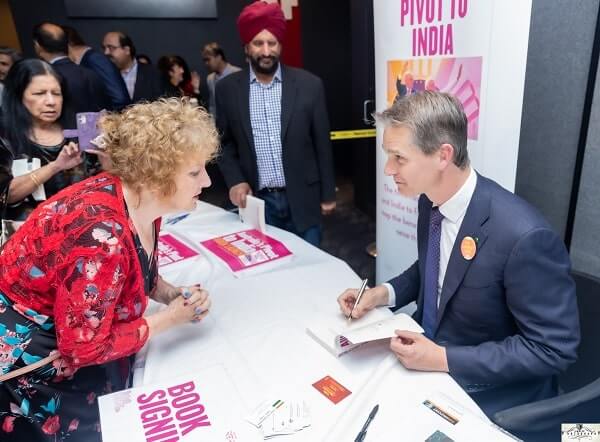Charlton is well-versed in the subject matter of his book Australia’s Pivot to India, having observed trends in India closely for more than two decades now, and the bilateral relationship even closer
Federal Member for Parramatta Andrew Charlton’s book Australia’s Pivot to India is about Australia’s deepening appreciation of India. Charlton recounts how the Sydney suburb of Harris Park got its name and that won him the loudest cheers when he launched his new book Australia’s Pivot to India (Black Inc Books), reported indianlink.com.au.
His story goes that the suburb was founded by John Harris, who arrived in Australia in the 1790s after serving ten years in India as a naval surgeon in Bengal. “So Harris Park’s first resident was a doctor from India,” the Member for Parramatta revealed to a largely Indian-origin audience. They packed a hall at Parramatta’s Riverside Theatres to see Prime Minister Anthony Albanese formally launch Andrew Charlton’s third book.
Among those present were the Indian High Commissioner Manpreet Vohra, former Australian High Commissioner to India Barry O’Farrell, MPs Tim Ayers, Warren Kirby and Donna Davis, City of Parramatta councillors, head of the Australia-India Business Council Jodi McKay, and everyone who’s anyone in Sydney’s Indian community.
Charlton segments this relationship in the book as moving from Acquaintances to Friends to Family to Partners – and those are his chapter names. “The relationship is in a magic moment,” Charlton said. “India will change Australia for the better, inside and out, over the next few decades.”
Charlton is well-versed in the subject matter of his book Australia’s Pivot to India, having observed trends in India closely for more than two decades now, and the bilateral relationship even closer. He takes us through the growth of modern India, especially the opening up of its economy and its particular bent on foreign affairs, and looks at how Australia’s relationship with India has ebbed and flowed, given Australia’s own stance in its economic and foreign policies.
For someone reading from outside the diaspora, perhaps the main insights will come from the sections that follow – those that describe the characteristics of the Indian-Australian community, their deep-rooted connections to the land of their birth, their contributions to their adopted country, and the professional, social, sporting, religious and cultural expressions. These go some way in understanding the ‘bridge’ that they are, or are expected to be, in drawing India and Australia closer.
As the ‘seeds’ to plant in the ‘fertile ground’ of the Australia-India relationship, the diaspora is vital in developing the relationship further. Charlton segments this relationship in the book as moving from Acquaintances to Friends to Family to Partners – and those are his chapter names. “The relationship is in a magic moment,” Charlton said. “India will change Australia for the better, inside and out, over the next few decades.”
**************************************************
Readers
These are extraordinary times. All of us have to rely on high-impact, trustworthy journalism. And this is especially true of the Indian Diaspora. Members of the Indian community overseas cannot be fed with inaccurate news.
Pravasi Samwad is a venture that has no shareholders. It is the result of an impassioned initiative of a handful of Indian journalists spread around the world. We have taken the small step forward with the pledge to provide news with accuracy, free from political and commercial influence. Our aim is to keep you, our readers, informed about developments at ‘home’ and across the world that affect you.
Please help us to keep our journalism independent and free.
In these difficult times, to run a news website requires finances. While every contribution, big or small, will makes a difference, we request our readers to put us in touch with advertisers worldwide. It will be a great help.
For more information: pravasisamwad00@gmail.com



